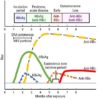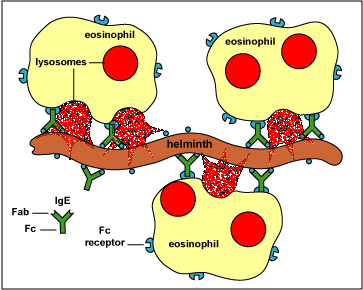IgE Immunoglobin E, Total
$84.00
CPT#: 82785
Evaluation of patients with suspected diseases associated with elevations in total immunoglobulin E (IgE), including MCAS, MCAD, histaminosis, allergic disease, parasites, parasitosis, primary immunodeficiencies, infections, malignancies, or other inflammatory diseases.
Clinical Information
Immunoglobulin E (IgE) is one of the 5 classes of immunoglobulins, and is defined by the presence of the epsilon heavy chain. It is the most recently described immunoglobulin. IgE is present in circulation at very low concentrations and is thought to be involved in defense against parasites, specifically helminthes.
The function of IgE is also distinct from other immunoglobulins in that it induces activation of mast cells and basophils through the cell-surface receptor Fc epsilon RI. Fc epsilon RI is a high-affinity receptor specific for IgE present at a high density on tissue-resident mast cells and basophils.
Elevated concentrations of IgE are generally thought of in the context of allergic disease. However, increases in the amount of circulating IgE can also be found in various other diseases, including primary parasitosis, immunodeficiencies, infections, inflammatory diseases, and malignancies. Total IgE measurements have limited utility for diagnostic evaluation of patients with suspected allergic disease, except for allergic bronchopulmonary aspergillosis (ABPA). ABPA is a hypersensitivity reaction against the fungi Aspergillus that occurs most frequently in patients with asthma or cystic fibrosis. An elevation of total IgE is part of the diagnostic criteria for ABPA, although the specific diagnostic concentration is dependent on certain patient characteristics.
Cautions
This test may exhibit interference when sample is collected from a person who is consuming a supplement with a high dose of biotin (also termed as vitamin B7 or B8, vitamin H, or coenzyme R). It is recommended to ask all patients who may be indicated for this test about biotin supplementation. Patients should be cautioned to stop biotin consumption at least 72 hours prior to the collection of a sample.
An elevated concentration of total immunoglobulin E (IgE) is not diagnostic for allergic disease, and must be interpreted in the clinical context of the patient, including age, gender, travel history, potential allergen exposure, and family history.
A normal concentration of total IgE does not eliminate the possibility of allergic disease. In patients with a high index of suspicion for allergic disease, testing for allergen-specific IgEs may be warranted.


